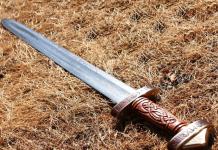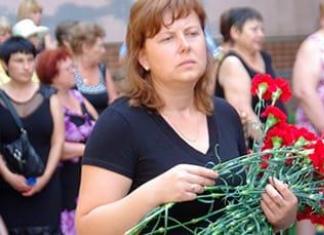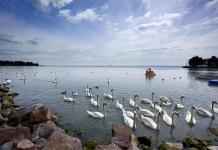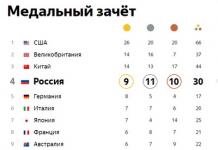MOSCOW STATE UNIVERSITY
named after M. V. Lomonosov
FACULTY OF SOIL SCIENCE
Department of Soil Biology
ESSAY
Mark Porcius Cato the Elder
Completed: student
5 courses
Pinchuk I.P.
Teachers:
Krasilnikov P.V.
Prokofieva T.V.
Moscow 2013
1. Introduction……………………………………………………………………...…3
2. Socio-historical conditions of Rome during the life of Mark Porcius Cato the Elder……………………………………………………………………….3
2.1. Natural conditions……………………………………………………….….3
2.2. Socio-historical conditions…………………………………………..4
3. Biography of Mark Portia Cato the Elder……………………………..…..8
4. The current situation in soil science at the time of Cato's life………….….11
5. Predecessors of Mark Porcius Cato…………………………………...13
6. The contribution of Mark Porcius Cato to the development of soil science……………….….14
7. Followers of Mark Porcius Cato…………………………………......17
8. The main works of Mark Porcius Cato………………………………18
References…………………………………………………………………19
1. Introduction.
Mark Porcius Cato the Elder (234-149 BC) Roman politician, commander, writer. He managed to rise from a petty plebeian, but a large landowner with great influence on his contemporaries. Cato is known to soil scientists for his treatise On Agriculture. The work contains many recommendations for the processing of soilyou, her improvement. And most importantly, it has survived to this day. And we can learn how the science of soil developed in Ancient Rome.
2. Socio-historical conditions of Rome during the life of Mark Porcius Cato the Elder.
Mark Porcius Cato the Elder lived from 234 to 149, during the time of continuous wars of Rome for new lands.
Rome was subject to a territory of more than twelve thousand square kilometers, with a population of more than six million people. In connection with the active policy of conquest, the lands devastated by the war, huge sums of money and hundreds of slaves were concentrated in the hands of the Roman Republic. The main contribution of capital, with the weak development of industry and trade, went to the agricultural sector.
- . natural conditions.
It is necessary to mention the nature of the Apennine Peninsula. Italy is predominantly a mountainous country. In the north the Alps, along the entire peninsula the Apennines. Also in the north is the Padan Plain, with the Po River flowing through it. The climate in Italy is subtropical Mediterranean, while the influence of the sea is enhanced by the Alps, located in the north, which delay the north and west winds. In addition, there is a high zonality in the mountains. In the Alpine zone, in the region of the Padan Plain, the climate is continental.
In connection with such physical and climatic conditions, in Italy the vegetation and soils are also extremely diverse. There are broad-leaved forests, alpine and floodplain meadows, swampy areas. The soils are mountain sod-calcareous, mountain brown, volcanic, brown, dark-colored, on the plains and floodplains - alluvial, brown forest.
From this we can conclude that there are not very many good lands suitable for agriculture on the Apennine Peninsula. In the presence of a small number of plains, and forests that were present in ancient times, fruit growing (for example, olive cultivation) and viticulture developed. The small area of cultivated land also led to the need for cultivation of mountain soils.
2.2 Socio-historical conditions.
Throughout its history, Rome has pursued an aggressive policy of "divide and conquer". The result of the conquest of the Apennine Peninsula was the creation under its auspices of the Roman-Italian Union a peculiar form of state organization, characteristic only of Ancient Rome. The connection between the individual parts and the Eternal City was political and held with the help of Roman weapons. Subjugated tribes and communities entered into numerous treaties with him.
In the Roman-Italian union, the entire free population was divided into three groups Roman citizens, the population of the Latin name and allies. Roman citizens had the right to vote and could participate in popular assemblies and hold the highest government positions. These included the indigenous inhabitants of Rome, as well as citizens of cities that received Roman citizenship, and inhabitants of Roman colonies. The inhabitants of Latin cities and colonies who did not receive Roman citizenship were Latin citizens. Officially, their position with the allies was the same, they were listed in the same category. But they were distinguished from the allies by the fact that in the case of resettlement in Rome, the Latins received all the rights of citizenship. The allies were the tribes defeated by the Romans and made an alliance with them. Below were the Gauls and Samnites, who fought a long struggle with Rome. They were called surrendered and enjoyed limited self-government.
Rome also carried out enhanced colonization of distant lands. During the Punic Wars, the Roman Republic received vast territories.
Mention should be made of the state structure of the Roman Republic. The popular assembly played a leading role. It adopted and repealed laws, declared war and made peace, it had judicial power. All government positions were elected only through him. An important role belonged to the Senate, it received laws, which were then sent to the people's assembly. The laws adopted there were approved by the Senate. There was no permanent bureaucracy in the Roman Republic. All executive power belonged to magistrates elected for one year - consuls, censors, praetors, praetors, aediles, quaestors. The consuls had the highest authority and commanded the army. Praetors held judicial power. Censors were in charge of law and order, landscaping, control of morals, and public lands. The quaestors controlled the state treasury and archives.
An extremely important period in the history of the Roman Republic at that time was the Punic Wars. Wars, as a result of which vast lands were conquered, and Carthage was destroyed.
The Carthaginian state (the Romans called the Phoenicians, the inhabitants of Carthage, Punians, since punicius “Purple Catcher”) occupied a vast territory, which included the Phoenician allied cities in North Africa, the tribes of the Libyans, as well as their colonies part of Spain, Sardinia, the regions of Sicily and the islands in the Mediterranean Sea.
There were three Punic Wars in total, which lasted 118 years (264-146 BC). They ended with the victory of the Roman Republic. Rome received vast territories in North Africa, Spain, the islands of Sicily, Sardinia and Corsica, new colonies were founded. Wealth and slaves poured into the country like a river. Italy has become a country with a developed slave economy and intensive agriculture, inextricably linked with the market.
The period from the Punic Wars is of interest in the history of ancient slavery. Such a rapid development of slaveholding relations is the result of several factors. The most important circumstance is that Rome, as a result of numerous campaigns of conquest, has become the largest world power. It included both developed Hellenistic countries, with their developed forms of ownership and exploitation, and peoples standing at different levels of the primitive communal system.
Thanks to the victories in the wars, the Roman Republic received new lands, which led to changes in pre-existing forms of exploitation. Until that time, there were two types of agrarian relations:
- Small peasant farms based on personal labor and the labor of a few slaves.
- Large estates of the nobility, where, in addition to slaves, an important role was played by clients-columns who were sitting on the ground and wholly dependent on the owner, there were also columns that received land under an agreement.
- In addition, there was the exploitation of indentured debtors. As a rule, the victims of creditors were bankrupt peasants working off their debt on the plantations of large landowners.
- A significant role was played by the labor of hired workers - politicians, especially in small and medium-sized farms. All urgent and labor-intensive work (for example, harvesting, harvesting grapes or olives, squeezing oil) was performed by hired laborers or contractors who delivered the required number of workers on time.
But, with the democratization of the system, and in connection with colonization, many peasants received allotments, and their dependence on the owner weakened. The emancipation of the clients increased the role of the slaves as they became the main exploited class.
The active spread of crops such as olives and grapes also contributed to the increasing role of slave labor. Cato noted that these crops are processed by slaves to a greater extent than cereals. Slave labor was also used in auxiliary enterprises focused on the urban market and supplying products for wealthy residents. Also in livestock farms.
The victorious wars enriched a lot of large and small businessmen, commanders, soldiers, etc., in connection with which the demand for goods, luxury goods, and land plots increased. Despite the fact that agriculture brought less profit (with the exception of the cultivation of certain specific crops oriented to the tastes of the aristocracy, as well as sheep farms), according to Roman traditions, it was the landowner who enjoyed the most respect.
Debts to usurers, and the seizure of state lands by the rich, as well as the active appropriation of peasant lands, undermined the small farms of small peasants. And, although free smallholders never disappeared from Italian lands, their economic and political weight fell. And at the same time, the influence of large and medium-sized landowners increased more and more.
Thus, in the Roman Republic it was simply necessary to develop the agronomic sciences, as well as to process and systematize the knowledge already acquired in the conquered areas.
3. Biography of Mark Portia Cato the Elder.
Mark Porcius Cato the Elder was born in 234 BC. e. (520 from the founding of Rome) in Tusculum in the Alban Mountains, southeast of Rome, in a poor plebeian family, a small estate.
At the age of 17, he began his military service in the war against Hannibal, and was distinguished by sufficient courage in battles .. In 214 BC. e. In Sicily, he was appointed military tribune under M. Claudius Marcellus, in 207 BC. e. he fought with distinction at the Battle of Metaurus. With the support of his wealthy countryman Fabius L. Valerius Flaccus in 204 BC. e. he accompanied the proconsul Scipio to Sicily and Africa. In 199 BC. e. he receives the plebeian aedilship, as well as the first province of Sardinia, where he goes as propraetor. In 195 BC. e. at the age of 39 he became consul.
As proconsul, Cato receives the province of Spain, which is in revolt. Having shown the talent of a commander, he soon suppressed it. He replenishes the treasury with receipts from the Spanish iron and silver mines. Here it is worth mentioning the mass executions and the enslavement of entire communities. He assigns a good salary to the soldiers, but he lives rather modestly.
In 191 BC. e. Cato enters the war against Antiochus III of Syria, where he once again proved himself a resourceful commander, skillfully bypassing the enemy from the rear. As a military tribune, he accompanies Consul Manius Acilius Glabrion to Greece, where he delivers speeches against anti-Roman propaganda.
Cato reached the pinnacle of his political career in 184 BC. e., when, having beaten seven competitors from the best families, together with his friend L. Valery Flaccus, he becomes a censor. It is known that even before this position, he was actively fighting against the violation of laws among major statesmen. For example, he accused the ruler of Liguria of executing ten free people, bypassing the legal procedure, and Scipio Africanus and his brother of appropriating public lands. And after receiving this position, he carried out these measures so actively that he earned the nickname Censor. Lucius Seneca spoke of him this way: "His life meant no less to the state than the life of Scipio: one fought against our enemies, the other against our morals."
He subjected the list of senators to a merciless revision, excluding from it seven unworthy ones, just as severely he revised the estate of horsemen. He fought against wealth and luxury (imposed a huge tax on expensive, slaves, carts and jewelry) with debauchery, he blames many for omissions in agriculture. Also, with his assistance, the use of public lands and water bodies by private individuals was prohibited.
The censors also carried out the construction of a number of public buildings, paved new roads, and renovated the city sewer. Livy wrote about him this way: “His spirit was harsh, his language was harsh and too free, but at the same time he was inaccessible to self-interest, possessed incorruptible honesty, despised seeking and wealth.”
It is not surprising that for the rest of his life he was persecuted by outraged aristocrats in court. However, none of the 44 trials resulted in a conviction.
And he understood the importance of small and medium-sized landowners for the Roman Republic, as a support for numerous legions, and carried out a number of measures aimed at preserving small and medium-sized farms (for example, he introduced new colonies in southern Italy). Despite the fact that the wars, the influx of wealth and slaves, dealt them a tangible blow. Cato's reforms were able to slow down the process of economic displacement of the peasantry.
Cato managed to rise from a plebeian, with a small piece of land, to a large landowner. He was engaged in a large number of quite profitable cases. Cato bought up the most profitable plots, gave money loans, traded in slaves, carried out many ingenious financial combinations. But he did not stop farming, perhaps more for pleasure.
Also, Cato continued active state and military activities. He was an influential lawyer, an excellent orator. He advocated the granting of freedom to Macedonia and the abolition of the declaration of war on Rhodes.
By the end of his life, Cato is actively involved in the fight against Carthage and demands its complete destruction. He concludes each of his speeches in the Senate with the words: "As for the rest, I believe that Carthage must be destroyed" ("Ceterum censeo Carthaginem esse delendam"). There were also people who tried to prevent it. But the authority of Cato was so great that his opinion won. It is believed that it was on his initiative that the third Punic War (149-146 BC) was unleashed, which ended with the fall of Carthage.
Shortly before his death, Cato sought the trial of Servius Sulpicius Galba, who sold a large number of local residents into slavery in his province. But Galba managed to get out and the indignant Cato captured this process and his own speech in origins, and soon after that, death found him with a lead in his hand. He died in 149, at the age of eighty.
Little is known about the family of Marcus Porcius Cato. From his first marriage he had a son, Mark, the addressee of several didactic works. Through his second son, who was born already in old age from a young girl, Cato became the great-grandfather of his namesake the great Republican Marcus Portius Cato the Younger.
4. Current situation in soil science at the time of Cato's life.
All the sciences of Ancient Rome were based on the accumulated knowledge of Ancient Greece. And the science of agriculture was no exception. The Hellenes achieved good results. It is among the ancient Greeks that we can find the first writings on agronomy, which speak of fertility, the differences between soils, and methods of cultivation. They understood that the soil has a profile, that its properties differ at different times of the year. What exactly depends on the soil, what, how, where and at what time to plant.
In addition, the Greeks put forward the theory that the soil is a body that changes with time. In ancient Greece, the first works on zoning of lands appeared, depending on the climate, natural conditions and geographical location. Plants, their features of growth and cultivation were actively studied.
Information about various soils and their processing, obtained as a result of military campaigns, travel and trade in the Mediterranean region, was collected and summarized. This was later very useful to Rome.
From the middle of II century BC e. the decline of ancient Greece began. It increasingly fell under the influence of the young and rapidly developing Roman Republic until it became one of its colonies.
The ancient Romans had a somewhat different attitude towards the science of soils. To a greater extent, they were interested in practical aspects, which they borrowed (soil properties, methods of processing grapes, etc.) Unlike the Greeks, who preferred to develop the philosophical direction, talking about the origin, change and structure of the soil cover. But, it should be noted that in ancient Rome, some authors praised the soil, and there were thoughts about its origin and development.
The Roman Republic was a militarized slave power, where the lands were of great political and economic importance. Therefore, for the most part, knowledge was required about the construction of various structures (roads, cities, aqueducts), the management of possessions, and the economic use of vast and diverse lands.
5. Predecessors of Mark Porcius Cato.
As mentioned above, Roman scientists relied on the Hellenes. Therefore, this chapter will review the main Greek scientists who contributed to the development of soil sciences.
Hesiod (VIII - VII centuries BC BC) in his poem "Works and Days" writes that the soil cover is not the same, that in the valleys the soil is more fertile than near the sea. Notes that moisture is a necessary condition for good farming. Gives advice on how to properly cultivate the soil.
The scientists-philosophers Empedocles and Aristotle speculated about the origin of all living things. Empedocles believed that the primary elements were earth, fire, water and air. And living beings originated from the soil. Aristotle developed these teachings, and added that plants feed on water and earth with the help of roots.
Xenophon (430-355 BC) mentions the soils of Greece, as well as their use and cultivation.
Theophrastus (372-287 BC) the first botanist who made a huge contribution to the development of the sciences of soil science. In his writings ("Research on Plants" - the first serious work on botany and agronomy), he considered the relationship of plants with climate and soil. He notes what a huge influence water has on plants, and the soil is its source. It also separates soils according to certain properties (clay, layered, marsh, etc.). He indicated which soils are suitable for certain species and varieties of cultivated plants.
Herodotus of Halicarnassus (c. 485-425 BC) traveled a lot and left a lot of information on the geography of the countries he visited. He noted the diversity of soils, classified them by color. Also, studying the soils of the Nile Valley, I found out that they depend on the relief and rocks.
Parmenides (540-470 BC) proposed the idea that the Earth is spherical and that there are zones or belts.
Eratosthenes (276-194 BC) geographer. He determined the length of the earth's meridian, based on climatic conditions, identified five belts. He also, according to natural conditions, divided the land into five regions Sphrarigds.
Thus, we can conclude that in Ancient Greece the accumulated knowledge about soil and agriculture was quite extensive. Many scientists have been interested in this. And the Romans had to process this information, adjust it to their needs and add something new.
6. Contribution of Mark Porcius Cato to the development of soil science.
In the field of agricultural sciences, Cato is primarily known for his treatise "On Agriculture" (" De agriculture "). It has come down to us almost in its entirety.
Cato was born into a poor plebeian family, so from early childhood he was familiar with agriculture. Then, he tried to present all the experience gained in his treatise.
There are several theories about the origin and writing of this work. The fact is that a systematic description of agricultural experience, agricultural technology is present only in the first sixty chapters. What follows are comments and admonitions that have little to do with each other. But half of the chapters are united by thematic connections. This gave rise to several assumptions regarding the origin of the treatise.
Some researchers believe that the treatise contains many insertions and transfers added during further numerous editings. Others believe that the original text has been lost, and that the current one is a collection of Cato's observations on agriculture, but neither collected by him nor edited by him. And another point of view that the treatise is a notebook of Cato. That is, it is simply a collection of comments on agriculture, in which he subsequently made various adjustments.
The treatise presents a number of important agronomic provisions, which are a generalization of the agronomic experience of Roman agriculture by the second century.
Cato gives valuable guidance on creating conditions for the development of plants, as well as on restoring soil fertility.
The main point of his theory is: “What does it mean to cultivate the land well: firstly plow well, secondly plow, thirdly cultivate”
He insists on the need for good ploughing, and advises the acquisition of good tillage implements.
He talks about the benefits of using fertilizers. Gives instructions on the use of manure, plowing green manure (while specifying the names of crops clover, lupine, vetch, beans) writes about compost. He devotes a lot of time to manure, methods of obtaining it.
Gives advice on what kind of soil to plant different types of plants: “This is what should be observed when planting individual places on the estate. Where there is a good fat field without trees, then it should be a grain field. The same field, if there is evaporation above it, should be planted mainly with turnips and radishes and sown with millet and mogar. He explains how to take care of the plants, especially the grapes and olives, which are valuable to Italy.
He also highlights such important irrigation and reclamation activities for Italy. Explains how best to irrigate the fields.
In addition to the most valuable advice on agriculture for that time, the book contains many recipes for dishes, methods for obtaining oil, recommendations for caring for farm animals, planting trees on the estate, and describes the healing properties of some plants. This book was an essential book for any Roman landowner, it contained almost everything.
Cato also devotes a lot of time to slaves, since most of the agricultural work lay on their shoulders. He calls to improve their living conditions, takes care of both physical and moral well-being. “Slaves should not feel bad: they should not starve. They are always at work with the fork: this way he will more easily keep them from evil and from theft, ”he says in his treatise.
While waging war with Carthage, the Romans saw that the principles of economic management, as well as agricultural techniques, were much more perfect there than in the Roman Republic. It was decided to translate the works of Mago into the language of the Romans. It should be noted here that the work of Mago was actually the only surviving work of the Carthaginians. This shows how important agriculture was to the Roman citizens and ideas for improving it.
For a hundred years, Cato's treatise was the main reference book of landowners. It has been rewritten several times. But gradually it became obsolete. The economy developed, new facts, new improvements were required, and the Roman landowners put the work of Cato aside. But Roman scientists have repeatedly used his work in their works.
7. Followers of Mark Porcius Cato.
Mark Terence Varro (116-27 BC) writer, scientist, encyclopedist. He was not a practitioner, and based all his writings on the experience of other people. He singled out agriculture as a very important science. He gave a fairly accurate classification of soils, identified up to three hundred varieties. Like Cato, he paid a lot of attention to accents. He put forward the first ideas about the need for crop rotation.
Publius Virgil Maron (70-19 BC) poet, author of the poem "Georgics". Poem A collection of agronomic advice in verse form. In addition to recommendations on crop rotation, fertilizers and other soil care, methods are given for assessing its quality by physical methods, for determining soil salinity,
Gaius Pliny the Elder (23 or 24-79 BC) author of Natural History. It was an encyclopedia of all the natural science knowledge of the ancient Romans accumulated by that time. He put forward the theory of a decline in fertility, and also noted that slave labor was less and less productive, since slaves were not interested in good tillage.
Lucius Junius Moderatus Columella ( I in BC) large landowner, author of the treatise "On Agriculture". He tried to refute the theory of diminishing fertility. He made attempts to create a scientific classification of soils according to a combination of features. He also proposed the first classification of fertilizers.
Strabo (64/63 BC 23/24 AD) Greek historian and geographer. He created "Geography in 17 books" - it contains detailed descriptions of countries, as well as theoretical provisions in the patterns of soil distribution.
So, we see that the science of soil science was actively developed in ancient Rome. And by the fall of the Roman Republic, extensive material had been accumulated, consisting of achievements both in the practical science of agriculture and in the theory of the origin of soils and the patterns of their distribution.
8. The main works of Mark Porcius Cato.
Cato was the first Roman to write down his speeches so that they could later be used in courts or at state councils. But most of the speeches have not reached us, only fragments remain. And he also created many works, becoming the founder of Roman prose literature. He is one of the greatest writers of Ancient Rome. Unfortunately, of all the works of Mark Porcius Cato, only a treatise has come down to us. Diagricultura , which was discussed in detail earlier.
He left his son Mark Pracepta ad filium an encyclopedia of worldly wisdom, a collection of instructions on medicine, agriculture, military affairs, as well as historical notes.
Carmen de moribus a short essay on customs. He also left many manuals on all sorts of issues: "Healing Art", "Oratory", books on military affairs, notes on agriculture. But these books, as well as speeches, have not survived.
In his old age he writes a work on the history of Rome origins ("Beginning"). The work consists of seven books. The first book was devoted to the history of the development of Rome from its foundation to the end of the era of kings. Second and third the rise of other Italic cities and peoples. In the fourth, the Punic Wars were set forth; in the rest, the events that took place up to the year 149, in which Marcus Porcius Cato the Elder died.
Bibliography.
- Albrecht M. History of Roman Literature. T.1. M., 2003
- Bursky M. I. Cato, Varro, Columella, Pliny on agriculture. Moscow-Leningrad, 1937.
- Dobrovolsky GV Lectures on the history and methodology of soil science.- Ed. Moscow State University, 2010.
- Cato. Agriculture. Moscow-Leningrad, 1950.
- Krupenikov. I. A. History of soil science. Science, M., 1981.
- Reviako. K. A. Punic Wars. Minsk, 1978.
- Shtaerman E.M. The heyday of slaveholding relations in the Roman Republic. Science, M., 1964
Mark Porcius Cato the Elder. Politics and ideology in the Roman Republic in the first half of the 2nd century. BC.
Introduction
Mark Porcius Cato the Elder or, as he was called by the highest office of the Roman Republic, the Censor is one of the most interesting figures in Roman history. Cato the Elder was an outstanding politician and commander, orator and writer. Cato can rightly be called the first Roman encyclopedist, the predecessor of Cicero, Varro, Pliny the Elder. Among his works, ancient authors mention treatises on law, military affairs, and agriculture (the only work of Cato that has come down to us in its entirety). Cato was the author of one of the first histories of Rome, and the concept of this work itself is interesting. Cato, unlike his predecessors, wrote not only the history of Rome - "Beginnings", but also the history of all Italy. In his work, the main characters were not generals and politicians, but the peoples of Italy. This position is quite consistent with the fact that Cato is one of the first provincials (he was originally from the city of Tuskula) who reached such a high position in the Roman state. Among his works, a kind of textbook on the history of Rome, written by Cato especially for his son, is mentioned. Cato was one of the first to transfer the political struggle to the arena of a duel, which later became a common occurrence in Roman political practice. In the case of judicial duel and oratory, Cato achieved perfection - he did not lose more than one of his cases. However, regarding the political activity and political ideology of Cato the Elder, among many researchers and those interested in the political history of Rome, there was a long-standing prejudice that Cato was the most malicious Roman "puritan", a persecutor of everything new, a hypocrite and an ignoramus. However, this view is one-sided and bears traces of bias. Other researchers see in Cato both an adherent of the "old senatorial republic" and "an idol of the Italian plowmen". Some historians generally reject the existence of any program in the policy of Cato and his opponents. Others see in the political struggle of the first half of the II century. BC. only the struggle between "Hellenophobes" and "Hellenophiles". All these opinions and conclusions, sometimes contradicting the testimony of ancient historians, are critical, and require a more thorough study of the political life of Rome at that time and the political biography of Cato the Censor himself. It is through the prism of the life and political activities of Cato the Elder that one can study the features of the political life of Rome and the formation of political ideology in Rome.
Mark Porcius Cato the Elder - politician and ideologue
Unfortunately, little information from ancient authors has come down to us that would report on the life and work of Cato the Censor. Of the reports of Cato's contemporaries, there are only excerpts from the "World History" of Polybius, who was in Rome during the political activities of Cato the Elder (Polyb. XXXI, 24; XXXV, 6; XXXVI, 8.6; XXXVII, 6.4-5; XXXIX , 12.5-9). Only in an abridged version did we get the biography of Cato, compiled by Cornelius Nepos (Corn. Nepo, De Latinis historicis, M. Porcius Cato, 3). This information about Cato and his political activities is supplemented by Cicero's dialogue "On Old Age", in which Cato is the main character. But we must take into account the fact that in the time of Cicero Cato is an idealized figure, but Cicero's information still cannot be neglected. In addition, Cicero's dialogue shows the attitude towards Cato the Elder in Roman society, especially among the senatorial class.
But Plutarch (Cato Mai., 1-33) sets out the biography of Cato most fully. Plutarch undoubtedly had at his disposal the work of Nepos, the missing books of Polybius, the works of Cato himself, as well as various autobiographical literature. A supplementary source to Plutarch are those books of the "History" of Titus Livius that tell about the political activities of Cato.
Mark Porcius Cato was born around 234 BC. in the old Latin municipality of Tusculum, in an equestrian family. The portions of Cato were related to the portions of Licins and Leks, who held the posts of praetors and aediles - lower, equestrian, magistracies. The father of Cato the Elder had high acquaintances in Rome (Val. Max., VIII,2,1), which was important for promotion and political career. It was on acquaintance and kinship that the political system of the Roman Republic was built. It was impossible to get into politics without strong patronage. Another way to move up the political ladder was to serve in the army. In the Roman state, a military career was inextricably linked with a civil one. Cato entered the military service at the age of 17 and went through the most important events and battles of the Hannibal war. During this time, he develops strong ties with prominent Roman politicians. He serves as a military tribune under Marcellus, under the command of Fabius Maximus he conquers Tarentum. Prosopographic data point to the connection of Fabius with the environment of Marcellus. Later, Cato serves with Gaius Claudius Nero, who was a friend and colleague of Marcellus. The first independent political speech of Cato is connected with the political grouping of Marcellus, Fabius and Claudius Nero. Cato protested against the "royal" behavior of Scipio Africanus, the famous Roman general. Scipio in Sicily distributed rich gifts to the troops and, according to Cato, corrupted the army with this. After such an accusation, Cato leaves Sicily and a long struggle between two famous Romans begins (Plut. Cat. Mai., 3). Moreover, Plutarch unequivocally connects this political demarche of Cato with Fabius Maximus and his hostile attitude towards Scipio (Plut. Cat. Mai., 3). The support of Cato by the venerable aristocrat Publius Valerius Flaccus, who was not only a friend of the Marcelli, but also a neighbor of the Porcii on the estate, dates back to the same time. We cannot accurately determine the political direction of the grouping that Cato entered at the end. Second Punic War. It can definitely be said that the young and capable municipality was drawn into the group of supporters of a cautious war with Hannibal and opponents of populist measures. The main enemy of this group, apparently, was Scipio Africanus, who acted boldly and unconventionally. For the generals who had been waging a “small” war against Hannibal for years, fearing another Cannae, Scipio’s bold and decisive actions and plans were crazy and unrealistic. They tried at all costs to remove the young commander from command of the army. The distaste of this grouping was also the behavior of Scipio, who arranged continuous festivities and amusements (Plut. Cat. Mai., 3). One of these attempts was the action of Cato in Sicily. This unsuccessful political speech by Cato determined the external outline of the entire political struggle in Rome in the first half of the 2nd century. BC. - as a struggle between Cato and Scipio and their factions.
Here it is necessary to say a few words about political groupings and "parties" at this time. Roman parties were groups of influential citizens united around one leader. Moreover, this group might not have clearly expressed interests and a political program. Such was the grouping of Scipio Africanus. The people who were grouped around him were gathered not so much on the basis of a professional-administrative principle or the principle of concurrence of views, but on the principle of kinship, friendship, joint military service, and so on. Such was the group to which Cato the Elder joined. But now Cato himself is already putting forward a certain political program in accordance with which he acts and fights against the group of Scipio.
The differences between Cato and Scipio were in the sphere of domestic and foreign policy. But, as already mentioned, Scipio did not have a special political program. The power of him and his group was based on the authority of Scipio himself, which he acquired from Roman citizens during the war with Hannibal. Titus Livy, when he speaks of the departure of Cato Scipio and his group from the Roman political scene under pressure, calls the reign of Scipio's group a "reign" (Liv. XXXVIII-XXXIX). During the years of Scipio's "primacy" in the Senate, the political face of the Roman magistrates changed. Not only skillful lawyers and military men gathered around Scipio, but also many adventurers and people who openly abused their power, and Cato opposed them. Cato, pursuing a tough policy in relation to the abuses of the senators, thus sought to maintain the authority of the Senate as a government body and limit the influence of populist leaders on the popular assembly.
In domestic policy, Cato had two directions, political-administrative, cultural and economic. The first included dealing with the abuses of the magistrates, especially in the newly created provinces, which led to revolts and discontent among the provincials. Cato, realizing the superiority of Hellenic culture and art over Roman-Latin, tried to create original scientific and artistic works in Latin, patronized the talented Latin poet Ennius (Corn. Nep., Cat. Mai., 1). In connection with the economic policy of Cato, it is necessary to dwell in detail on the activities carried out by Cato together with Valerius Flaccus during their censorship in 184 BC. and their followers. From the very beginning of his censorship, Cato checks the senatorial and equestrian class. Struggling with the ever-growing self-will of the high officials in the provinces (Plut., Cato Mai., 17-18; Liv., XXXIX, 40-44). Many representatives of the Roman nobility, seizing land on the ager publicus and amassing wealth in the provinces, strove for uncontrolled power in the senate. In this regard, he took the following steps. He restricted the consumption of luxury goods (Plut., Cato Mai., 18; Liv., XXXIX, 44), and those that came to Rome from other countries, where Roman gold flowed. He fought against the illegal occupation of the ager publicus, destroying buildings that went beyond private lands. Interesting is another measure of Cato, directed against profiting from farming - he raised the price of farming state taxes to the limit. These measures were taken not only to combat the nobility, but also to develop medium-sized estates. This is confirmed by the fact that Cato, in his censorship, reduces the payment for contracts (Plut., Cato Mai., 18-19), which, accordingly, should have reduced the cost of building a villa and seasonal work on the estate. On this occasion, it should be noted that Cato himself in his "Agriculture" often mentions the contracting of part of agricultural and building work (Cato, De agri cultura, 2.6; 14-15; 16; 144-145). Therefore, it was precisely such owners who benefited from the reduction in contract fees. In the same vein, one can perceive the law introduced into the censorship of Cato by Orchius, which limited the number of feasts and guests, as well as the Fannius law of 161 BC, which limited the cost of feasts from 10 to 100 asses (Gell., II. 24.1). The authors of the luxury laws could, among other considerations, help to market the cheaper local products. Thus, Cato's censorship and subsequent legislative acts were supposed to serve the development of local Italian agriculture, which was destroyed during the years of the war with Hannibal. Moreover, small and medium-sized landowners suffered the most. Cato's policy was openly protectionist and aimed at exporting Italian goods to Gaul, Iliyrik, the Danubian and Rhine regions.
In foreign policy, Cato had his own specific program, which he formulated in his speeches. The main points of this program were the maintenance of legal norms in relation to the allies, the replacement of clientele with provincial government and the destruction of the Carthaginian state.
The first point arose from the fact that many Roman magistrates committed abuses against their allies, using authoritarian power based on military superiority. Cato countered this with the thorough observance of treaties, especially with regard to the Italian allies, since they were the main military collaborators of Rome. However, for a long time in Roman political life, the opinion of Cato was ignored, and the rights of the allies were often infringed, which led to a major war with Rome with its allies in the 90s of the 1st century. BC. Cato in the first half of the II century. BC. pursued the idea of the unity of Rome and Italics. This is confirmed by the fact that in his "Principles" Cato describes not the history of Rome, but the history of all the peoples of Italy.
The second point of Cato's program was also finally realized only in the time of the Empire, when most of the conquered peoples were included in the provinces. In the first half of the II century. BC. there was a dispute about how to organize the leadership of the conquered provinces. One way was the clientele system, when a conquered tribe or kingdom retained its sovereignty, but became a vassal of the Roman state and decided on its foreign policy in the Roman Senate. The patron (patron) in Rome of such a kingdom or tribe could be one of the prominent Roman senators. Such a system had a certain flaw, since relations between the conquered region and Rome were built through an intermediary who could abuse his position and demand a certain bribe for resolving the issue. Such relations were built only on the basis of the personal factor and belittled the role of state influence on foreign policy. One of the creators of such a system was Scipio Africanus. Cato opposed such a system, he proposed building relations with conquered peoples not on the basis of a personal factor, but on the basis of state control in new provinces, when an official who abused his position could be replaced and punished.
It is no coincidence that his desire to destroy Carthage (the war with which began shortly before the death of Cato the Elder in 149 BC) is quite connected with the economic policy of Cato. There is no need to say that Cato was born, grew up and himself participated in the confrontation between Rome and Carthage. But Carthage, even after the defeat, remained one of the main political and commercial rivals of Rome. Cato, after his stay in Carthage, in a speech before the senate focuses on the agrarian achievements of Carthage (Plut., Cato Mai., 27).
All thoughts in the direction of the domestic and foreign policy of the Roman Republic were formulated and developed by Cato in his speeches, treatises and "Beginnings", where, by the way, Cato himself placed all his speeches. It can be assumed that the "Beginnings" of Cato were created as a kind of program document, setting out the program of actions of Cato himself.
The thoughts of Cato the Elder and the foundations of his policy were supported by subsequent generations of Roman politicians. Later, Cato draws closer to a part of the Roman nobility, which also sought to preserve the free Italic peasantry as the backbone of the Roman state and army. And also, while maintaining the average estate economy, to counteract the growth of large land holdings. So Cato binds himself with family ties to the house of Scipio Aemilianus and other noble families (Plut., Cato Mai., 21; Cic., De senectute, I, 3). It was from this pro-reformist milieu that the Gracchi brothers emerged. A follower of the political ideology of Cato the Elder was Cicero, who followed the Cato's precepts and even tried to idealize the image of the stern Censor. Many of Cato's ideas found their embodiment in the imperial era.
Mark Porcius Cato (later nicknamed the Elder) came from an old Roman family, which was not distinguished by either nobility or wealth. The family owned a small plot of land in the Samnite region. Like all Romans, Cato's father and grandfather participated in wars, fought courageously, returned with awards, but they did not make any significant career, military or political.
Mark Portia was born in 234 BC. e. He grew up as a healthy, strong child, a brave young man. He was ugly, which allowed his enemies to mock him, but he was smart and sharp-tongued.
When Marcus Porcius was seventeen years old, a new war broke out with Carthage, threatening the very existence of Rome. The Carthaginian commander Hannibal, crossing the Alps with his troops, invaded Italy. In this terrible time for the motherland, young Mark Portia fought in the army as a simple warrior. Hannibal won victory after victory, approaching Rome. But the Romans were stubborn and patient. No one spared either strength or means to fight the enemy. Danger brought everyone together.
Marcus Portius participated in many battles in Italy lost by the Romans. He also fought in Africa, in the battle near the city of Zama, which ended in a brilliant victory over Carthage. The young warrior was distinguished by courage and endurance and was noticed by the generals Fabius Maximus and Scipio the Elder.
Cato led a harsh and simple life. In the parking lots, he helped his slave cook food and did not pay attention to whether it was tasty
285
turned out. He did not take part in the soldiers' feasts, did not drink wine, quenching his thirst only with water. Only sometimes, after a long tiring hike, in order to relieve fatigue, Cato added a few drops of wine to the water.
The simple, unassuming life of the ancient Romans was Cato's ideal. Since childhood, he sought to imitate them. In particular, he was attracted by the life of the consul Manius Curius, who became famous for his victories over the Samnites and Pyrrhus. Manius Curius, already an illustrious commander, who had been triumphant three times, continued to cultivate his small piece of land himself. It was said that once the ambassadors of the Samnites came to him. They found Manius at the hearth, he was preparing boiled turnips for dinner. The Samnites offered him gold to stop the war, Manius drove them away:
- He who is content with such a simple meal does not need gold! It is better to defeat those who own wealth than to have it yourself!
All his life Cato imitated Manius Curius.
Between wars, Marcus Portius returned home and worked in the fields with his slaves.
At this time, he began to try his hand as an orator, speaking in courts, defending the interests of his neighbors. The young lawyer was already well known in the neighborhood, and many were afraid of his caustic and witty speeches.
Rumors about Cato's lifestyle, his industriousness, intelligence and oratorical gift reached his noble neighbor - Lucius Valerius Flaccus, an aristocrat who was bored in his village estate. He wished to meet a man who sought to revive the ancient Roman manners and customs. The acquaintance took place and gradually turned into a close friendship.
Flaccus suggested that Cato go to Rome and try to make a political career. He promised his support, without which it was difficult for a person who did not belong to the nobility to count on success.
In Rome, Cato soon attracted attention with his passionate. witty speeches and excellent knowledge of Roman laws. I was struck by his stormy energy and modest, ascetic lifestyle. A relatively short time passed, and Cato became one of the most famous Roman orators. His contemporaries called him "Roman Demosthenes".
An important role in the life of Cato was played by the support of his friend Valerius Flaccus, a well-known and influential person. Thanks to this support and his own talent, Cato achieved a lot.
When the war with Hannibal ended, Cato was elected praetor, he was entrusted with the management of the island of Sardinia. He turned out to be an excellent ruler and skillfully defended the interests of Rome, causing
286

respect for the Roman state and for oneself. Unlike earlier praetors, he did not burden the inhabitants of the island with excessive exactions in his favor. Ruling a large island, he, as always, led a simple life. The daily maintenance that was due to him and his retinue amazed the islanders, who were accustomed to the shameless robberies of the Roman governors, with their modesty. However, Cato knew how to be harsh and even merciless when the interests of Rome required it. As a judge, he was fair, impartial and, unlike his predecessors, completely incorruptible. Subsequently, the inhabitants of the island said that the Romans had never been more respected by the Sardinians and at the same time they had never been so afraid of the Romans as during the reign of Cato.
In the election of consuls in 195 BC. e. Cato won. He took the highest position in the state. His noble friend Lucius Valerius Flaccus was chosen second consul. This happened when an uprising broke out in Spain against Roman rule.
Numerous warlike Spanish tribes that inhabited the north and west of the Iberian Peninsula did not want to come to terms with the rule of Rome. Before the fury of their attacks, even the disciplined, well-trained Roman legions often had to retreat. To finally get rid of the foreign yoke, the Spaniards lacked cohesion and unity. Discord between individual tribes did not stop. From the very beginning of the uprising, the Romans suffered setbacks. In the south of the peninsula, the governor of Rome was killed, and his legions were defeated. In the north, the Romans had difficulty repulsing the attacks of the rebels who were pressing them.
The difficult and dangerous situation in Spain forced Rome to
287
send reinforcements there. They were led by the consul Cato, who landed with his legions on the east coast of Spain.
Cato acted quickly and decisively. He managed to impose a decisive battle on the rebels, in which the military skill, discipline and experience of the Romans triumphed over the courage of the Spaniards. Fresh reserves, brought into the battle at a turning point, decided its outcome. The Spaniards were defeated. All of southern Spain submitted to Rome.
However, the calm did not last long. The humility of the Spaniards was forced, they still strived for freedom, ready to rebel at the first opportunity. No sooner had word spread that Cato and his legions had left Spain and returned to Rome, the uprising broke out again. The rumor turned out to be false. Cato threw his forces to pacify the uprising. This time he acted with particular cruelty. The rebels were defeated. Some of them were exterminated, and many captives were sold into slavery. By order of Cato, the Spanish cities were ordered to demolish the fortifications and destroy the walls. Spain was pacified for a long time.
For his victories in Spain, Mark Porcius Cato was awarded a triumph, this humble man achieved the highest honors.
Cato continued to faithfully serve the republic. In any post entrusted to him, he showed energy, perseverance and earned the respect and trust of fellow citizens.
When the war began with the Syrian king Antiochus III, Cato went to Greece, where hostilities unfolded. During the war with Antiochus III, the Romans again had to face their old enemy, the Carthaginian commander Hannibal. Hannibal was the most implacable and dangerous enemy of Rome.
After the end of the second Punic War, Hannibal did not accept defeat and made every effort to prepare Carthage for a new war with the Roman Republic. Rome demanded the extradition of Hannibal from the Carthaginian Senate. To avoid extradition, Hannibal fled to the Syrian king Antiochus III, who was preparing for war with Rome. The great Carthaginian commander proposed to the king a bold plan of war: the army of Antiochus was to land in Greece, where the Aetolian League of Greek cities hostile to Rome was ready to help the Syrians. In the event of early successes, King Antiochus could also count on support from Macedonia. At the same time, Hannibal, at the head of an eleven thousandth Syrian army and a fleet of hundreds of warships, intended to raise an uprising in Carthage against the Senate, and then land in Italy.
However, this grand plan failed. The genius of Hannibal, as during the second Punic War, faced the short-sightedness and ill will of the allies. court-
288
The people of the Syrian king envied the importance that the Carthaginian newcomer had acquired at the court of Antiochus III.
The proud and insignificant king listened to the slanders of the courtiers, who inspired him that the glory of the Carthaginian overshadowed the glory of the king. Antiochus began to move away from Hannibal, gradually removing him from business. He stopped listening to Hannibal's advice. Of all the grandiose plans of the Carthaginian commander, Antiochus carried out only a landing in Greece. However, most of the Greeks and the Macedonian kingdom did not support him. A significant role in this was played by Mark Porcius Cato, his deft diplomacy, his oratory, his ability to convince.
Cato, with several other Roman representatives, having arrived on the Balkan Peninsula, traveled around the cities of Corinth, Athens, Patras and others. He managed to persuade the citizens not to support the Syrian king, not to act on his side. Only an insignificant part of the Greeks joined the Syrian army that landed in Central Greece.
In 191 BC. e. against the Syrians in Greece was sent with a legion of the consul Manius Acilius Glabrion. Among his military tribunes were Mark Porcius Cato and Lucius Valerius Flaccus. A Roman army of 20,000 easily captured Northern Greece. Antiochus, with his comparatively small force, attempted to defend Central and Southern Greece. He occupied the narrow Thermopylae pass between the mountains, memorable for the Greeks. The main forces of the Romans, under the command of the consul, were preparing to break through a hard-to-reach mountain pass. A detachment of soldiers, led by Cato, was sent to bypass the positions of the Syrians. Cato completed the task assigned to him, hitting the enemy from the rear. The army of Antiochus was almost completely destroyed. The king himself barely escaped with a few hundred horsemen.
An outstanding role in this battle was played by Cato. After the victory in front of the whole army, the consul embraced and thanked Cato. It was Cato who was instructed to go to Rome with the news of the victory. In Rome he was received as the conqueror of Antiochus.
Mark Portia became famous not only for military exploits. He was an outstanding speaker and writer. The Romans marveled at his manner of writing for many years to come.
In his political views, he was a supporter of the unity of Roman society. He wanted to see Rome as it was before the war with Hannibal, when both the aristocracy and the common people were unanimous in their desire to win, to expand their lands. Cato was frightened by the growth of property inequality in Roman society, he saw the growing contrast between rich and poor Romans. With all his strength, with all the means available to him, Cato fought for unity, for the rallying of the Roman people, for reducing the differences between the simple and the noble. He saw unity as a guarantee
289
the power of Rome. Therefore, he sharply opposed those who, by their actions, undermined the unity of the republic.
- For the Romans, - said Cato, - it is best to observe the ancient laws and those customs, thanks to which Rome reached its power and prosperity.
Cato also saw how, with the growth of the wealth of the top of Roman society - the nobility - noble people turn into a closed group in which not talents and abilities are valued, but connections and high origin. The Roman nobles were increasingly arrogant towards ordinary citizens who did not have privileges.
As the wealth of the nobility grew, so did the discontent of the rest of the Roman citizens. Capable people from the people, not finding use for their talents, not having access to the ranks of the nobility, more often became enemies of the nobility. Thus, the aristocracy itself undermined its position, contributing to the stratification of society, the destruction of the unity of the Roman people, which Cato so sought to preserve.
Throughout his life, Mark Porcius initiated lawsuits against those who, in his opinion, by their actions harmed the unity of Roman society, the solidity of the state. He often sought the conviction of lawbreakers. But he himself was sometimes sought to be brought to trial by numerous enemies.
Already a deep old man (in 149 BC), Cato brought to court the governor of Spain, Servius Sulpicius Galba. His long struggle with the famous Scipio the Elder is memorable. Even during the war with Hannibal, Cato - together with Fabius Maximus - was not afraid to publicly accuse the illustrious commander of wasting public money. At that time, Scipio was considered the only person capable of resisting the genius of Hannibal. Therefore, the Senate was forced to declare the charges against him unfounded. However, Cato did not leave the commander alone. During the war with Antiochus III, Cato brought new accusations against Scipio, already nicknamed "African" for his victories over Carthage.
Using his great influence, Scipio promoted relatives and friends to government positions. He bribed voters with generous distributions of bread, attracted soldiers to his side with handouts at the expense of state funds. Scipio made his brother Lucius, a mediocre man, the commander of the army at the last stage of the war with the Syrian king Antiochus. Thanks to this, the insignificant Lucius Scipio received the right to triumph on a par with honored Roman generals. There were enough reasons to bring charges against Scipio, but only Cato had the courage to speak out against the almighty commander. Cato demanded the death penalty for him for abuse of power, embezzlement, bribing voters and striving for dominance in the state.
290
state. Only the glory of the conqueror Hannibal saved Scipio. However, his brother Lucius almost went to jail and had to pay a heavy fine. The Scipio family was disgraced, and the commander himself lost power. Seeing the collapse of all his hopes, Scipio the Elder, nicknamed "African", retired from Rome and died in exile.
Cato also spoke out against other violators of the laws. Thus, he attacked the family of Quinctius, whose representative Titus Quinctius Flamininus, the famous conqueror of the Macedonian king, tried to imitate Scipio the Elder. Cato managed to prove to the Romans that neither nobility, nor wealth, nor glory will save from punishment those who, having become proud, will try to violate grandfather's customs and laws.
But gradually Cato himself began to move away from his ideals. His words and demands were increasingly at odds with deeds. Power, honor and wealth changed a lot in the life of Cato. Once he vigorously fought against merchants and usurers who ruined the Roman peasants. In his old age, in an effort to increase his fortune, Cato himself became no stranger to speculation, doing it through figureheads, secretly.
In his youth, Cato surprised neighbors and acquaintances by working in the field with slaves, eating the same food. During the campaigns, Cato shared the hardships of military life with his slave, treating him almost as an equal. In old age, he became a prudent and cruel slave owner. In his book On Agriculture, Marcus Portius gives advice on how to get more profit from the labor of slaves, saving on their maintenance.
Cato mercilessly disposed of slaves who were no longer able to work, although they had grown old on his estate. Once struck by the modesty of life, the unpretentiousness of food, Cato began to arrange magnificent dinner parties. He severely punished slaves for the smallest offenses: a poorly set table, coughing or sneezing in the presence of guests. The slaves were terrified of their cruel master. A case is known when one of his slaves committed suicide in order not to answer to the owner for some insignificant offense.
In his youth, Cato studied with the Greek philosopher Nearchus. I read a lot of Greek authors. All this contributed to the development of his taste, oratory and writing gift. Towards the end of his life, however, he became hostile to everything foreign, especially hated Greek literature and everything related to Greece. He even argued that the study of Greek literature could ruin the Roman Republic. Here is what he wrote to his son: “What I say about the Greeks is based on my own experience gained by me in Athens. Their writings should only be viewed, but not studied in any way. Believe me, the Greeks are a corrupt people to the core, incapable of rationally governing themselves. If they transfer their education to us, everything is lost.”
291
The more Cato departed from ancient customs, the more mercilessly he persecuted others for this. He constantly scolded the younger generation; his behavior became more and more hypocritical, hypocritical.
In 184 BC. e. Cato and his friend Flaccus were chosen by the censors. This position in Rome was an honorary one, and was usually received at the end of a political career, completing it. The censors monitored the morals and behavior of citizens, controlled the actions of the senate, and were in charge of state property. Only the censors could change the composition of the Senate and expel from it those deemed unworthy.
The position of censor did not come easily to Cato. He had to overcome the resistance of the Roman aristocrats. They did not want a man of humble origin, an "upstart", as they called him, to take one of the most important and honorable positions in the republic. In addition, many feared that, having become a censor, he would mercilessly persecute anyone who violated the law in any way.
Being a censor, Cato did his best to show himself as the former unswerving defender of antiquity, a man who protects the treasury of the republic. Rome was supplied with free water, but the maintenance of aqueducts required a lot of money. Pipes supplied water to many private houses and gardens. Cato ordered these water pipes to be dismantled so that all citizens, without distinction, could use common street water columns and fountains. This reform gave Rome a negligible economy, but caused many inconveniences and embarrassments to the inhabitants. However, the Roman poor were pleased that the aristocrats were also forced to use the common city water sources.
Cato the censor also fought against those fellow citizens who erected buildings on land belonging to the state. By his order, even the most beautiful houses, villas and country cottages of the rich, who built up state plots of land, were ruthlessly demolished. This destructive activity of the censor did not give anything to the people, but the plebs were satisfied. With such cheap tricks, Cato gained popularity among the people.
Despite the constant flirting with the people, Cato at the end of his life was most closely associated with Roman businessmen, merchants, usurers. These segments of the population of Rome were strongly opposed to Carthage, although this city had long ceased to threaten the dominance of Rome in the Mediterranean. And militarily, he did not pose the same danger. However, Roman merchants and speculators were afraid of the competition of experienced and dexterous Carthaginian merchants. Cato was entirely on their side. He began to constantly oppose Carthage, calling for a new war with it, for its destruction. Every speech, no matter what it was, Cato ended with the words:
- And Carthage must be destroyed!
292
This expression became a household word and was forever associated with the personality of Cato.In the end, Cato got his way. In the third and last Punic War (149-146 BC), Carthage was taken, the city was razed to the ground, the inhabitants were killed or sold into slavery.
Cato died a very old man. And although at the end of his life he betrayed his views and ideals, he died surrounded by honor and respect. A statue of him was placed in one of the Roman temples. Descendants glorified him as a stern, incorruptible censor who protected the good morals of the Romans, forgetting about the hypocrisy and hypocrisy that distinguished Cato at the end of his life.
Prepared by edition:
Famous Greeks and Romans: 35 biographies of prominent figures in Greece and Rome. Collection. Authors and compilers M. N. Botvinnik and M. B. Rabinovich - St. Petersburg: Kuznetsov’s Individual Private Enterprise “Publishing House “Epokha”, 1993. 448 p.ISBN 5-87594-034-4.
© M. N. Botvinnik and M. B. Rabinovich, authors of the transcription, 1993
, Orator , Statesman
Marcus Porcius Cato (lat. Marcus Porcius Cato; 234 - 149 BC), usually called, in contrast to his great-grandson Marcus Portius Cato the Younger, a contemporary of Julius Caesar, the Elder (Major) and also called by Roman writers the Censor (Censorius, Censor) - is one of the largest figures of ancient Rome, both as a statesman and as a writer.
Descended from the plebeian family of the Porcii, whose ancestor was probably engaged in the breeding of pigs (porcus), Cato the Elder was born in 234 BC. e. (520 from the foundation of Rome) in Tusculum and spent his youth partly on the Sabine estate, doing agriculture, partly on campaigns, partly speaking at the Roman forum as a gratuitous defender of the accused. Already 17 years old, he, fighting with Hannibal, had, according to Plutarch, many wounds.
When speaking to the wise, use few words.
Cato Mark Porcius (senior)
In 204 BC e., having received a questura, he went with Publius Scipio, later called the African, to Sicily, and the next year he crossed with him to Africa, covering transport ships during this crossing.
In 199 BC e. he received the post of aedile, in 198 BC. e. - a praetor, and for management he got the province of Sardinia; in 195 BC e., despite the strict persecution by him as a praetor of usurers, who were expelled by him from the island of Sardinia, he was elected consul together with his fellow countryman and patron L. Valerius Flaccus.
His efforts as consul to prevent the repeal of the Oppian law against luxury were unsuccessful. Having received the proconsular administration of near (Citerior) Spain, he won many victories there, for which, upon his return to Rome, he was awarded a triumph. He said that he conquered more cities in Spain than how many days he had been there. In 191 BC e. he took part in the war with Antiochus as legate of Manius Acilius Glabrio and defeated his army at Thermopylae.
If someone has praised you, check for yourself if this is true.
Cato Mark Porcius (senior)
Returning to Rome, he began to take an active part in the meetings of the Senate, in popular assemblies and in court cases. In the Senate, he declared himself especially opposed to the receipt of triumphs by various commanders (Minutius Fermas, Manius Acilius Glabrion, M. Fulvius Nobilior). In 184 BC. e. he received, along with the same L. Valery Flaccus, censorship.
In this position, he marked himself with unusual severity: he expelled seven senators from the senate and, among them, the former praetor Manilius, for the mere fact that he kissed his wife during the day and in the presence of his daughter; crossed out several persons from the list of riders on unimportant pretexts (one for being fat, the other for a joke during a censor's review); he especially opposed luxury, taxing women's jewelry and young slaves heavily, and everywhere rebelling against the violation of public interests in favor of private ones (for example, against the seizure of public land during construction and against the abuse of public water pipes).
And later he was an active defender of any measure directed against the corruption of morals, fighting with all his might against foreign (especially Greek) influence. When in 155 BC. e. the Athenian embassy arrived in Rome with the philosopher Carneades at the head and its effect on the Roman youth became noticeable, Cato tried his best to get the guests home as soon as possible.
Human life is like iron. If you use it in business, it wears out, but if you do not use it, rust eats it.
Cato Mark Porcius (senior)
His struggle against Greek learning remained without result; but the irreconcilable hostility to Carthage, the destruction of which he stubbornly did not cease to demand until the end of his life (his usual saying in the Senate is known: “Ceterum censeo Carthaginem esse delendam” (“Carthage must be destroyed”), has borne fruit, although Cato himself did not was destined to live to see his wish come true.
The harshness of his character and strictness towards people made him many enemies: therefore, as Pliny the Elder testifies, he was called to court 44 times, but was never convicted. Died in 149 BC. e.
Cultural heritage
In Roman literature, it is even more important than in public life. He can be called the founder of Roman prose literature, to which he gave examples both in eloquence, and in history, and in various other forms, being indisputably the most important prose writer during the entire 6th century of Rome, with the beginning of which Roman literature in general arose.
Master the deed, the words will be found.
Cato Mark Porcius (senior)
The speeches and the historical work entitled "Origines" were the most prominent products of the literary activity of Cato; but, according to Cicero (De orat., III, 33), there was nothing “that Cato did not investigate and know about and write about later.”
He compiled a kind of encyclopedia of various sciences, in the form of instructions intended for his son Mark (Praecepta ad filium). This encyclopedia contained articles on agriculture, medicine, military affairs, and on all subjects, the knowledge of which was useful to a good citizen.
Nothing from this collection has survived to us, just as Cato's letters, a collection of sayings of famous people and a poetic poem quoted by Gellius and bearing the title "Carmen de moribus" have not survived.
Learning is the sweet fruit of a bitter root.
Cato Mark Porcius (senior)
Speeches
Eloquence was closely connected with political and civil life in general in Rome, and therefore existed in Rome from the earliest times of the state; but only with Cato does it become an art for which the right preparation is required.
Despite his dislike of the Greeks, Cato studied the theory of eloquence from their books and compiled the first Roman rhetoric. Both by this manual, and especially by his speeches, where the theory of oratory was applied to the case, Cato showed a huge influence on the eloquence of his time, as well as on subsequent speakers.
After him, there were many speeches made in the Senate, in popular assemblies and in courts. In the time of Cicero, more than 150 of them were in circulation in the public, and the famous orator, who studied them carefully, says (Brut., 17) that they contain all the virtues that are required from an orator.
Whoever attaches importance to empty deeds will turn out to be an empty person in important deeds.
Cato Mark Porcius (senior)
If these speeches were no longer read in the classical age of eloquence, it was only because their obsolete language prevented this. Cicero compares Cato as a speaker with the Greek orator Lysia, finding between them a special similarity in sharpness, elegance and brevity.
By force and venom, which sometimes appeared in the speeches of Cato, Plutarch (Cat., 4) compares this patriarch of Roman eloquence even with Demosthenes. An example of this strength and causticity is the passage preserved by Gellius, where, attacking the commanders who appropriated public money, Cato says: “Thieves who have robbed private individuals spend their lives in prisons and chains, and public thieves in gold and purple.”
As an example of the skilful construction of Cato's speeches, excerpts from his speech in defense of the Rhodians, preserved by the same Gellius, to whom the greedy senators wanted to declare war on an empty pretext, while sound political considerations demanded the maintenance of peaceful relations with a rich island friendly to Rome, can be indicated.
And yet Carthage must be destroyed!
Cato Mark Porcius (senior)
These passages are given in translation in V. I. Modestov’s Lectures on the History of Roman Literature (pp. 144–145, ed. 1888). In general, Cato's speeches have not come down to us, and the fragments preserved in the form of quotations by ancient writers refer to approximately 93 speeches and are collected from Meyer, in his Oratorum Romanorum fragmenta (Zurich, 1872, 2nd ed.).
"Beginnings"
Cato laid the foundation for Roman historiography. The Roman historians who preceded him wrote in Greek. Published by Cato in seven books, the composition "Origines" (Beginnings) is not only the first historical work in Latin, but also extremely important for getting to know Roman and, in general, ancient Italian history.
It was written from sources that were later little used by Roman annalists and historians. Here, ancient fasts, local chronicles of various Italian cities were taken into account; it was generally a history as documentary as possible, and Roman writers from Cornelius Nepos to Servius unanimously speak of the extraordinary thoroughness of its author in collecting materials.
It's one thing to be on time, another thing to rush.
Cato Mark Porcius (senior)
It was written by Cato in his old age. Chronologically, it embraced six centuries (up to 603 from the founding of Rome), and its name, "Beginnings", received from the fact that two books (second and third) were devoted to the origin of different cities of Italy. So, at least, explains this name Cornelius Nepos (Cat., 3).
These two books, as well as the first, which spoke of Rome during the royal period, were without a doubt the most valuable for Roman historians. From the "Beginnings" only fragments have come down to us, which are best published by Germ. Peter in his Historicorum Romanorum reliquiae (Lpts., 1870).
Mark Porcius Cato, later nicknamed the Elder (234-149), came from an ancient Roman family, not distinguished by either nobility or wealth. The family owned a small plot of land in the Samnite region. Cato's ancestors took part in wars, returned with awards for courage and courage, but none of them made a significant career.
Marcus Portius was born in 234 BC. in Tuskul. He grew up healthy, strong and brave. He was ugly, but smart and sharp-tongued. When Mark was 17 years old, war broke out with Carthage, threatening the very existence of Rome. The Carthaginian commander Hannibal, crossing the Alps with his troops, invaded Italy. Mark Portia fought in the army as a simple warrior. Hannibal won victory after victory, approaching Rome. The Romans stubbornly and patiently fought the enemy, defending their homeland. Mark Portia participated in many battles in Italy, fought in Africa, participated in the battle of the city of Zama, which ended in a brilliant victory over the army of Hannibal. The young warrior Mark Porcius Cato was distinguished by his courage and endurance, and was noticed by the Roman generals Fabius Maximus and Scipio the Elder.
The simple, unassuming life of the Romans was ideal for Cato. Between wars, Marcus Portius returned home and worked in the fields with his slaves. Mark Portia also tried his hand as a speaker, speaking in courts, defending the interests of his neighbors. The young lawyer was well known in the neighborhood, and many were afraid of his caustic and witty speeches. Rumors about Cato's lifestyle, his industriousness, intelligence and oratorical gift reached his noble neighbor, Lucius Valerius Flaccus, an aristocrat who was bored in his village estate. He wished to meet a man who sought to revive the ancient Roman manners and customs. The acquaintance took place and gradually turned into a close friendship. Flaccus suggested that Cato go to Rome, try to make a political career. Flaccus promised his support, without which it was difficult for a person who did not belong to the nobility to count on success. A relatively short time passed, and Cato became one of the most famous orators. Contemporaries even called him "Roman Demosthenes". An important role in the life of Cato was played by the support of his friend Valerius Flaccus, a well-known and influential person. Thanks to this support and his own talents, Cato achieved a lot. When the war with Hannibal ended, Cato was elected praetor. He was entrusted with the management of the island of Sardinia. Cato turned out to be an excellent ruler, he skillfully defended the interests of Rome, causing respect for the Roman state and for himself.
In the election of consuls in 195 BC. Cato won. He took the highest position in the state - he was elected consul. His noble friend Lucius Valerius Flaccus was chosen as the second consul in the state. This happened when an uprising broke out in Spain against Roman rule. Numerous warlike Spanish tribes that inhabited the north and west of the Iberian Peninsula did not want to come to terms with the rule of Rome. The difficult and dangerous situation in Spain forced Rome to send reinforcements there. At the head of the reinforcements was the consul Cato, who landed with his legions on the east coast of Spain. Cato acted quickly and decisively. He managed to impose a decisive battle on the rebels, in which the military skill, discipline and experience of the Romans triumphed over the courage of the Spaniards. Fresh reserves, brought into the battle at a turning point, decided its outcome. The Spaniards were defeated. All of southern Spain submitted to Rome. For his victories in Spain, Marcus Porcius Cato was honored with a triumph. This humble man reached the highest honors.
At the end of the second Punic War, Hannibal did not accept defeat and did not lose hope of taking revenge. He made every effort to prepare Carthage for a new war with the Roman Republic. Rome demanded the extradition of Hannibal from the Carthaginian Senate. To avoid extradition, Hannibal fled to the Syrian king Antiochus III *, who was preparing for a war with Rome. (* Antiochus III the Great (242-187) - the king of the Seleucid state. He subdued the Parthians. Having been defeated by the Romans in the Syrian war of 192-188, he lost the territories of Asia Minor. The Seleucids - the royal dynasty that ruled in 312-64 on Near and Middle East The main territory is Syria Founded by Seleucus I - the commander of Alexander the Great The Seleucid state reached its peak in the 3rd century BC under Antiochus III The Seleucid state was conquered by Rome in 64 BC The Parthian kingdom - the state 250s BC - 224 AD Parthians - an Iranian tribe Parthian kingdom - a rival of Rome in the East.) The great Carthaginian commander Hannibal proposed to King Antiochus III a bold war plan: Antiochus's army was to land in Greece, where the Aetolian League* of Greek cities hostile to Rome was ready to help the Syrians. (* Aetolian Union - a federation of the ancient Greek cities of Aetolia in the III-II centuries BC) In the event of early successes, King Antiochus could count on support from Macedonia. At the same time, Hannibal, at the head of an 11,000-strong Syrian army and a fleet of hundreds of warships, intended to raise an uprising in Carthage against the Senate, and then land in Italy. However, this grand plan failed. The genius of Hannibal, as during the second Punic War, faced the short-sightedness and ill will of the allies.
A significant role in the collapse of this plan was played by Mark Porcius Cato, his deft diplomacy, oratory, ability to convince ... Cato arrived on the Balkan Peninsula, traveled around Corinth, Athens and other cities with speeches. Cato managed to persuade the citizens not to support the Syrian king, not to act on his side.
Mark Portia was an outstanding speaker and writer. His style of writing was imitated by the Romans for many years. The first Roman history written in prose and in Latin is that of Marcus Porcius Cato the Elder Censor. The heyday of Cato's activity falls on the era of the decisive victories of the Romans in the Balkan Peninsula. In this regard, the Roman national identity is growing. A chronicle written in Greek no longer satisfies the needs of Roman society. As a historian, Cato wrote a remarkable work called the Elements in seven books. The first three books detailed Greek and local legends about early Rome and other Italic cities. The fourth and fifth books were devoted to the Punic Wars. The sixth and seventh books told about later events up to 149. Cato arranged his material into sections, depending on the homogeneity of the facts. Therefore, he can be considered the first Roman historian in the proper sense of the word. Cato made extensive use of various official documents and carefully studied his sources.
Cato is considered one of the founders of Latin literary prose (along with Appius Claudius). Towards the end of his life, Cato literary processed and published the most important of his speeches. There were at least 150 of them. Despite some archaism of his language, there is already an element of artistry in it. Cato's speeches are characterized by expressiveness, wit and resourcefulness, full of well-aimed comparisons, proverbs and sayings.
Cato was an exemplary family man in the old Roman spirit. He himself was engaged in the education of his son Mark and wrote several manuals for this purpose, which together constituted something like an encyclopedia of knowledge necessary for a young Roman. These included writings on medicine, eloquence, military affairs and jurisprudence. In addition, Cato wrote several essays for a wider readership. This is a special work on military affairs and the famous essay "On Agriculture". In the work “On Agriculture”, Cato gives instructions not only on agriculture, but also on home economics, including the rules for cooking, medical prescriptions, etc. The work “On Agriculture” is of great historical value, reflecting the economic and agricultural practice of Central Italy.
With age, Cato began to depart from the ideals of his youth. His words and demands were increasingly at odds with deeds. Power, honor and wealth changed a lot in the life of Cato. Once he vigorously fought against merchants and usurers who ruined the Roman peasants. In his old age, in an effort to increase his fortune, Cato himself became no stranger to speculation, doing it through figureheads, secretly. In his youth, Cato surprised his neighbors by working in the field with slaves, eating the same food as the slaves. During the campaigns, Cato shared the hardships of military life with his slave, treating him almost as an equal. In his old age, he became a prudent and cruel slave owner. In his book On Agriculture, Marcus Portius gives advice on how to get more profit from the labor of slaves, saving on their maintenance. Cato mercilessly disposed of slaves who were no longer able to work, although they had grown old on his estate.
According to his political views, Cato was a supporter of the unity of Roman society, expressed the aggressive aspirations of the agrarian and slave-owning circles of Rome.
In 184 BC. Cato and his friend Flaccus were chosen by the censors. This position in Rome was very honorable. Usually it was received at the end of a political career, completing it. The censors monitored the morals and behavior of citizens, controlled the actions of the senate, and were in charge of state property. Only the censors could change the composition of the Senate and expel from it people deemed unworthy. The position of censor did not come easily to Cato. He had to overcome the resistance of the Roman aristocrats. They did not want a man of humble origin to occupy one of the most important and honorable positions in the republic. Many feared that, having become a censor, he would mercilessly persecute anyone who violated the law in any way.
Having become a censor, Cato did his best to show himself as a steadfast defender of antiquity, a man who protects the treasury of the republic. Cato the censor fought against those fellow citizens who erected buildings on land belonging to the state. By his order, even the most beautiful houses, villas and country cottages of the rich, who built up state plots of land, were ruthlessly demolished. This destructive activity did not give anything to the people, but the plebs were satisfied.
At the end of his life, Cato was most closely associated with Roman businessmen, merchants, usurers. These segments of the population of Rome were strongly opposed to Carthage. Although this city militarily did not pose the same danger. However, Roman merchants and speculators were afraid of the competition of experienced and dexterous Carthaginian merchants. Cato was on the side of the merchants. He constantly opposed Carthage, calling for a new war with him. Every speech, no matter what it was, Cato ended with the words: "Carthage must be destroyed!". This expression became winged and forever remained associated with the name of Cato.
As a result, Cato achieved his goal: in the third and last Punic War (149-146), Carthage was taken, the city was razed to the ground, the inhabitants were killed or sold into slavery. True, Cato did not live to see this moment.
Mark Tullius Cicero
The great orator, writer and politician Marcus Tullius Cicero (106 BC - 43 BC) came from a wealthy Roman horseman family*.
* Riders (equites) - the Roman class. Initially, 18 equestrian centuries (80 people, not 100) made up the Roman cavalry. They were recruited from the richest people of the first property class, tk. service in the cavalry was very expensive. Riders received a subsidy from the state for the purchase and maintenance of a horse. Starting from the III century BC. equestrianism is transformed from a military branch into a new equestrian estate (ordo equester). Horsemen cease to serve in the cavalry, which is now recruited from the allies, they only supply higher officers for the infantry and cavalry. The Law of Claudius (218 BC) was an important step towards the separation of the equestrian estate: the law forbade the senators to trade and isolated them as an agrarian group, thanks to which trade, farming and, in general, all financial affairs passed into the hands of the horsemen. The equestrian estate became the Roman monetary aristocracy.
Even as a child, Cicero showed brilliant abilities in teaching. When Cicero grew up, his father moved to Rome to educate him and his brother Quintus. In the capital, the young man studied Roman law, studied Greek philosophy, and the theory of rhetoric. In the company of Greek scientists and writers, Cicero thoroughly studied the Greek language and literature. Especially the young man became interested in dialectics (the art of argument and persuasion). At the same time, he practiced declamation - composing speeches in Greek and Latin. From the actors, Cicero learned pronunciation, voice production and oratorical gestures.
After school, Mark Tullius served in the army, participated in the war. At the end of his service, the twenty-year-old Cicero decided to devote himself to political activity.
In republican Rome, ignoble youths could come to the fore only by appearing in some high-profile trial as an advocate or accuser. It was a convenient opportunity to express one's views on various issues of public life, to draw attention to oneself.
As an honest and humane man, Cicerne was horrified by the violence and cruelty perpetrated by the dictator Sulla and his supporters. Cicero decided to act as a defender of the victims of the dictatorial regime.
One day, a rich landowner, a certain Sextus Roscius, was killed on the streets of Rome. The murder was staged by relatives in order to take possession of his property. They entered into an agreement with the all-powerful favorite of the dictator Sulla Chrysogonus, who bought up the property of the murdered man for a pittance. The relatives of the deceased tried to eliminate the legitimate heir - the son of Sextus Roscius. When they failed, they charged the young man with parricide. No one wanted to take on the protection of the young Roscius for fear of Cornelius Sulla. Only Cicero agreed to protect the unfortunate. The case of Roscius was so clear that it was not difficult for a lawyer to prove his innocence. But this was not enough for Cicero. Everyone knew that the all-powerful Chrysogonus was behind the accuser. This temporary worker considered himself completely safe, because. he got away with not doing such things. Cicero in his speech was not afraid to stigmatize Sulla's favorite. When the young orator uttered the name of Chrysogonus, the accusers and the crowd of people froze in silence. However, Cicero, continuing to remain calm, put forward one accusation after another, stigmatizing the man before whom everyone trembled. The judges and the public understood that Cicero was blaming Sulla himself in the person of Chrysogon. In conclusion, the young speaker demanded an end to the vile regime. His speech was met with applause, and the accused was acquitted by the court. Shortly thereafter, Cicero, together with his brother Quintus, left to travel to Greece and Asia Minor, ostensibly for treatment, but in fact - fearing persecution from Sulla.
After the death of Sulla, Cicero returned to Rome. He resumed his public appearances as a defender. The extraordinary talent of the orator brought him fame and connections in influential circles of the capital, which allowed him to enter into an advantageous marriage with Terentia, a woman from a wealthy family. Cicero became a wealthy man and could provide free assistance to those in need of protection. Elected quaestor, he was sent to the island of Sicily to prepare bread. In this post, Cicero showed exceptional efficiency. Having won the favor of the people, he was soon elected praetor, then consul.
Cicero's consulate coincided with the discovery of the famous Catiline conspiracy. Lucius Sergius Catiline was a ruined aristocrat, an associate of Sulla. He sought the position of consul, but was not elected. Catiline conspired, acted decisively and energetically, gathering armed detachments of his adherents. In Rome, he instructed his supporters to kill Cicero. However, he was warned in time, the conspirators were captured and executed without trial. Catiline himself went to Etruria, where he managed to form an army from Sulla's veterans. After some time, the army of Catiline was utterly defeated, and the head of the conspiracy fell in battle (63 BC). Thus, an attempt to carry out a coup in Rome was thwarted.
The merits of Cicero in liquidating the plot of Catiline were appreciated by the optimates * and the horsemen. The man, whom they until recently contemptuously called an upstart, was showered with immoderate praise and even presented him with the honorary title of "father of the fatherland." The son of a wretched provincial horseman became the leader of the senate!
* Optimates (from Latin optimus - excellent) - the name used in Rome for supporters of the senate and traditional (aristocratic) forms of government. Optimates - defenders of patrician privileges, who sought to exclude all other classes of the people from participating in government. The Optimates sought to maintain an aristocratic republic based on the rule of a few. Optimates were opposed to the populace - opponents of the Senate Republic, expressing the interests of the plebs, provincials and equestrian class. The most famous of the optimates was Sulla.
In 60, the three most powerful people in Rome - Caesar, Pompey and Crassus - entered into an alliance, the so-called first triumvirate. After vain attempts to win Cicero over to their side, the triumvirs decided to get rid of him. First, Caesar suggested that the orator go to command the legion in Gaul. But Cicero refused. After some time, Cicero was sent as governor to the province of Cilicia (in Asia Minor). Along the way, the Greeks met him with honor, and he could see that the fame of him as an orator and writer had spread everywhere. Cicero was an exemplary ruler: he did not allow Roman tax-farmers and merchants to rob the local population. He was fair, incorruptible and easily accessible to all who wished to turn to him. At the end of his term, Cicero, accompanied by grateful Cilicians, sailed to Italy. He entered the Italian coast during terrible events - a war for power began between Caesar and Pompey (48).
During the dictatorship of Caesar, Cicero withdrew from public activity, devoting all his time to scientific and literary pursuits. Occasionally he came to the city to greet Caesar. During this period, family troubles added to the sadness of the death of the republic, many friends and associates of Cicero: he had to part with his wife Terentia, with whom he lived for many years. The financial situation of Cicero was very difficult - he was burdened with large debts. In addition, Cicero suffered another misfortune - his beloved daughter died.
In 44, a conspiracy was drawn up against Caesar, led by Brutus and Cassius. Cicero, although he had the most friendly relations with almost all the conspirators, was not privy to their plans. Immediately after the assassination of Caesar, the great orator returned to political activity and became the head of the Senate party. At this time, the 18-year-old heir of Caesar Octavian arrived in Rome, interrupting his studies in Greece. Octavian announced that he accepts Caesar's inheritance (already partially plundered by Mark Antony) and undertakes to immediately pay the people the money bequeathed by Julius Caesar. Giving generous promises, the young man recruited an army from Caesar's former soldiers in order, as he said, to achieve an inheritance and take revenge on the murderers. In the forum and on the streets of Rome, Octavian urged the people to oppose the consul Anthony, accusing him of treason against Caesar and delaying money for the common people. Antony was opposed by Cicero. Octavian handed over to Cicero and the Senate party military detachments to fight Antony. Cicero happily agreed. Cicero expected that the young man in his hands would become an obedient tool. The young man, however, deftly played on Cicero's vanity, assuring the orator that he would follow his advice in everything.
Octavian won and entered Rome at the head of his legions. Even earlier, he agreed with Antony and Lepidus on the division of power (this conspiracy is called second triumvirate). The triumvirs announced, following the example of Sulla, proscription lists of persons whom it was decided to destroy. Under pressure from Antony, Cicero was the first to be added to this list. Cicero died at the hands of assassins sent by the triumvirs at the age of 64 in 43 BC.
Creativity Cicero
More than a hundred speeches by Cicero were published (only 58 have survived). The speeches were based on a deep study of various kinds of theoretical issues. For example, in the dialogue On the Oratore (De oratore, 55 BC), the basic requirements for a speaker are listed: the art of eloquence requires the speaker to have extensive knowledge in the field of philosophy, history, legislation and literature so that he can transfer the discussion of any issue to higher realms, rather than being limited to narrow (legal) issues. The rhetorical technique of Cicero is borrowed from the Greeks. Cicero establishes five main criteria for a successful speech: 1) inventio - finding suitable material; 2) dispositio - its location; 3) dictio - style; 4) memoria - memorization; 5) actio - execution.
Two works on rhetoric, Brutus and Orator, appeared in 46 BC. In addition to a very valuable list of famous Roman orators of the era, these dialogues contain a discussion of the advantages of the Asiatic style and Atticism. Asianism was a richly decorated prose prone to sonorous phrases, accentuated rhythmic effects, lush metaphors and other figures. Atticism included simplicity and clarity, avoided rhetorical effects. Cicero himself argued for a compromise between these styles and believed that an eloquent person pursues three goals with his speech: to defend his point of view, to please listeners, and to make listeners join his position. Each of these tasks has its own style: the simplicity of atticism for proof; a medium style, smooth, rounded, not too artificial, will captivate the audience, while the pompous style of Asianism will sway them to the side of the speaker.
The letters, originally not intended for publication (although Cicero later decided to publish a selection of his own), are extremely sincere and artless (in contrast to thoughtful and circumspect speeches). They freely discuss all the topics that were then of general interest. In the letters we see Caesar speaking condescendingly at 49 BC. to Cicero for support, and we hear Cicero's answer, diplomatic, but still saying that he remains with Pompey. We also see the young Octavian, who diligently courts Cicero at the end of his days, and then changes course and dooms him to death. The letters give historians a lot of biographical information about Cicero himself: the collapse of an almost 30-year marriage with Terence, the short-lived union of Cicero with his ward Publius, constant financial worries.
In the field of philosophy, Cicero was not an original thinker. All his treatises are useful because they represent, without any biased distortion, the teachings of the leading schools of Greece and Rome, i.e. Stoics, Academicians, Epicureans and others. Philosophical eclecticism (the mechanical combination of heterogeneous views in research) of Cicero ceases to amaze us if we remember that he was generally inclined to compromise, and his philosophy as a whole coincides with his political principles. The attention of Cicero was invariably attracted primarily by the problems of ethics, his main work in this area - On the distinction between good and evil (De finibus bonorum et malorum, 45 BC). The sorrows that befell Cicero towards the end of his life prompted him to write books about fate and providence, old age and friendship. The main place among them is occupied by the dialogue On the nature of the gods (De natura deorum), which presents the views of three philosophical schools.
Poetry. As a poet, Cicero was ridiculed by many critics, in particular Juvenal. However, the Greek historian Plutarch, in his biography of Cicero, notes that during his lifetime Cicero achieved the same reputation in this area as in rhetoric. In poetry, he remained predominantly a conservative, and, apparently, did not approve of such innovators as Catullus. Quite extensive fragments of Cicero's poem About my Consulate (De consulato suo), as well as many excerpts from his translations by Greek authors, have survived.



































